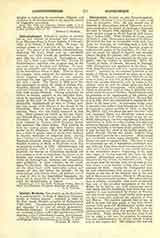

Albrechtsberger, JOHANN G., master of musical theory, and teacher of Hummel and Beethoven, b. at Klosterneuburg in Lower Austria, February 3, 1736; d. in Vienna, March 7, 1809. He began his musical career as a choirboy at the early age of seven. The pastor of St. Martin‘s, Klosterneuburg, observing the boy’s talent and his remarkable industry, and being himself an excellent musician, gave him the first lessons in thoroughbass, and even had a little organ built for him. Young Albrechtsberger’s ambition was so great that he did not even rest on Sundays and holidays. To complete his scientific and musical studies, he repaired to the Benedictine Abbey at Melk. Here his beautiful soprano voice attracted the attention of the future Emperor Leopold, who on one occasion expressed his high appreciation, and presented the boy with a ducat. The library at Melk gave him the opportunity to study the works of Caldara Fux, Pergolese, Handel, Graun, etc. The result was the profound knowledge of music which gave him a high rank among theorists. Having completed his studies he became organist at the cathedral there, where he remained for twelve years. He next had charge of the choir at Raab in Hungary, and at Mariatafel. Subsequently he went to Vienna, having been named choir-director of the church of the Carmelites. Here he took lessons from the court organist, Mann, who was highly esteemed at that time. Mann became his friend, as did also Joseph and Michael Haydn, Gassmann, and other excellent musicians. In 1772 he obtained the position of court organist in Vienna, which Emperor Joseph had promised him years before. This position he held for twenty years, and then became choir-master at St. Stephen’s. Here he gathered about him a circle of pupils, some of whom were destined to become musicians of immortal fame. Among them Ludwig von Beethoven, Joseph Eybler, Johann Nepomuk Hummel, Joseph Weigl and others. The Swedish Academy of Music at Stockholm made him an honorary member in 1798. Albrechtsberger will probably always hold a high rank among musical scientists, his treatise on composition especially will ever remain a work of importance by reason of its lucidity and minuteness of detail. His complete works on thoroughbass, harmony, and composition were published, in three volumes, by his pupil, Ignaz Von Seyfried. His many church compositions, on the other hand, while technically correct and ornate, are dry, and betray the theorist. Of his compositions only twenty-seven are printed, out of a total of 261; of the unpublished remainder, the larger part is preserved in the library of the Gesellschaft der Musikfreunde at Vienna.
J. A. VOLKER

